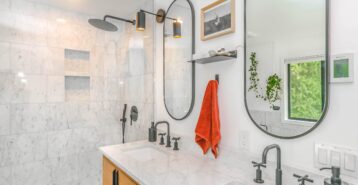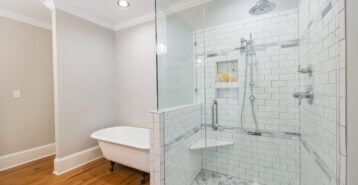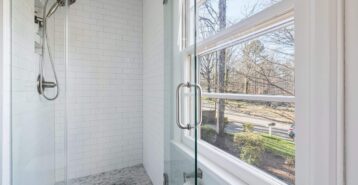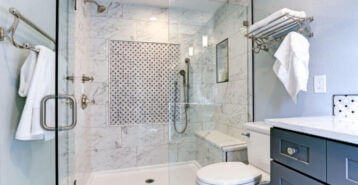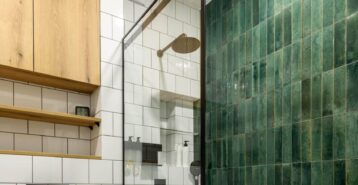Best Types of Showers
There are a few different types of showers to consider depending on your space and desires when upgrading your bathroom. As you read about each, consider your bathroom’s size, your own aesthetic style, and what future buyers may want if you plan to sell in the next few years.
| Shower Type | Average Cost | Best For | Avoid If / Where |
|---|---|---|---|
| Frameless Showers | $3,900 to $11,000 | Primary bathrooms, modern or luxury homes, showcasing tile and fixtures | Tight budgets, very small bathrooms, areas prone to water escaping |
| Semi-Frameless Showers | $2,300 to $8,200 | Most bathroom sizes, homeowners wanting a sleek look without full frameless cost | Those needing the lowest-cost option or maximum water containment |
| Framed Shower Enclosures | $2,800 to $7,200 | Budget-friendly remodels, guest bathrooms, family homes | Homeowners prioritizing modern design or low maintenance |
| Double Showers | $3,000 to $12,000 | Large primary bathrooms, couples, accessibility needs | Small bathrooms, limited plumbing capacity, lower budgets |
| Walk-In Showers | $2,500 to $15,000 | Accessibility, aging in place, modern bathroom upgrades | Very small bathrooms, cold climates, tight budgets |
| Corner Showers | $2,900 to $8,000 | Small bathrooms, space-saving layouts, half-bath conversions | Homeowners wanting a larger or more open shower |
| Steam Showers | $3,000 to $14,500 | Spa-like upgrades, luxury homes, resale-focused remodels | Homeowners wanting minimal maintenance or lower upfront costs |
Here are the basic options to consider for different types of shower frames and enclosures.
1. Frameless Showers
Average cost:$3,900 to $11,000

Frameless shower enclosures are sleek, strong glass enclosures that do not need metal framework to support the edges.
Pros and Cons
Pros
Cons
What Else to Know
Frameless showers tend to work best in large master bathrooms. But they can be installed in mid-sized or small bathrooms if space allows. Our frameless shower buying guide can tell you everything else you need to know.
2. Semi-Frameless Showers
Average cost: $2,300 to $8,200

Semi-frameless showers have sturdy metal window structures, but keep the door portion frame-free.
Pros and Cons
Pros
Cons
What Else to Know
In our opinion, this shower option is the perfect middle ground between totally frameless enclosures and framed enclosures. It will cost you less to install compared to a frameless shower, plus you have the option of sliding glass doors or a swinging glass door. Read our semi-frameless shower buying guide for more information.
3. Framed Shower Enclosures
Average cost: $2,800 to $7,200
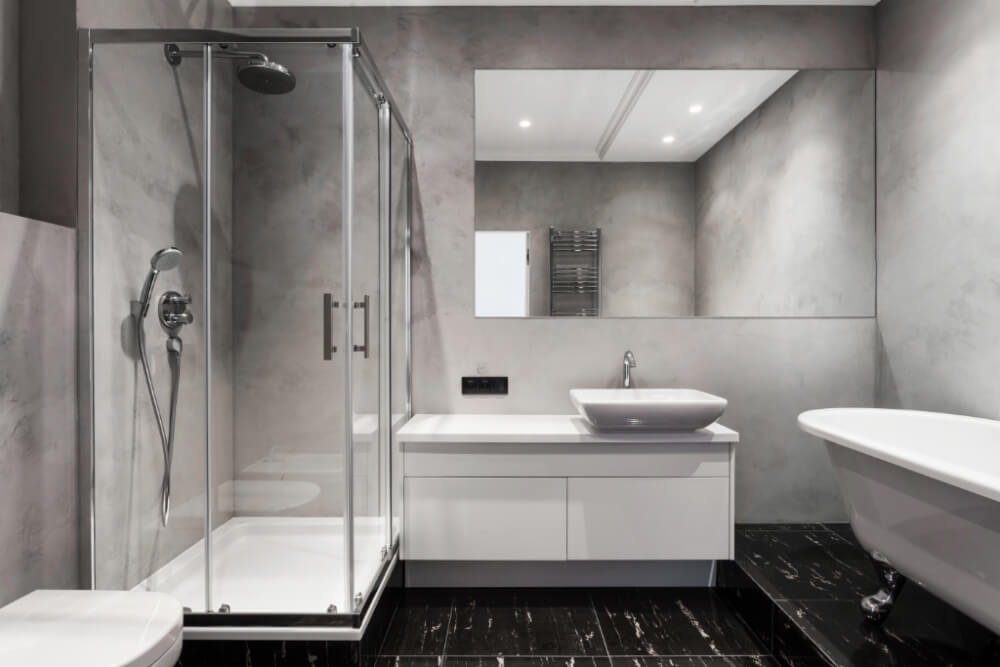
This shower type has framing that outlines the whole enclosure, including the doorways.
Pros and Cons
Pros
Cons
What Else to Know
Sliding glass doors and freestanding showers with a swinging door are both available when you choose a framed enclosure. You can learn more by reading our framed shower buying guide.
4. Double Showers
Average cost: $3,000 to $12,000
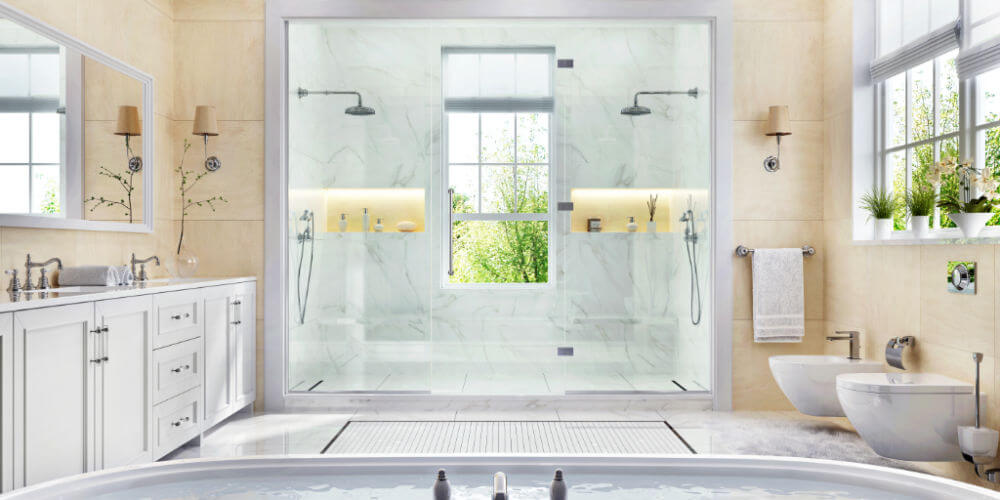
Double showers feature two separate shower heads, often on opposite walls, allowing partners to shower at the same time.
Pros and Cons
Pros
Cons
What Else to Know
Double showers can be added feature to other shower types on this list. For example, perhaps you’d like a frameless double shower or would like one without a door. Check out our double shower buying guide for all the information you need.
5. Walk-in Showers
Average cost: $2,500 to $15,000
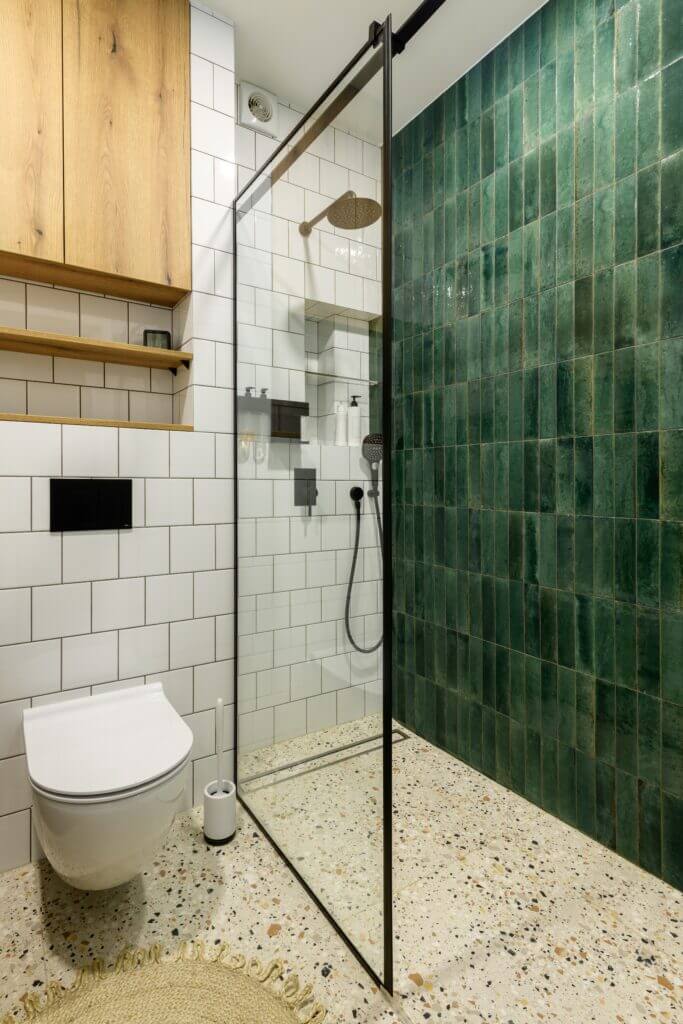
Walk-in showers are just what they sound like: a shower with no step into it as well as no door.
Pros and Cons
[pros_cons pros=”Sleek, modern aesthetic | Great choice for accessibility and safety concerns | Can make your bathroom feel larger and more open” cons=”One of the more expensive shower types | The lack of a door means more heat loss than other showers experience | Do not always contain water effectively”]
What Else to Know
These showers are especially popular modern additions for master bathrooms and larger bathrooms, but there are lots of walk-in shower ideas for small bathrooms, too. Read our full guide to walk-in showers to learn more or visit our walk-in shower cost guide to get specific pricing information.
6. Corner Showers
Average cost: $2,900 to $8,000
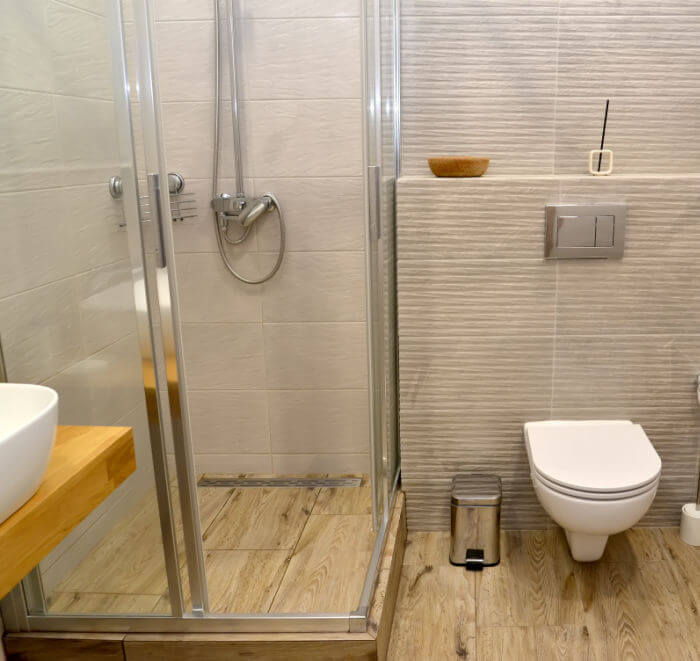
Corner showers are designed to save space while still giving you a full shower in a small bathroom.
Pros and Cons
Pros
Cons
What Else to Know
These types of showers are just 42 inches by 42 inches or smaller and fit against two of your bathroom walls. If you have a smaller bathroom or are looking to transform a half bath into a full bathroom to boost your home’s resale value, these are the perfect solution. Check out our guide to corner showers for more information.
7. Steam Showers
Average cost: $3,000 to $14,500
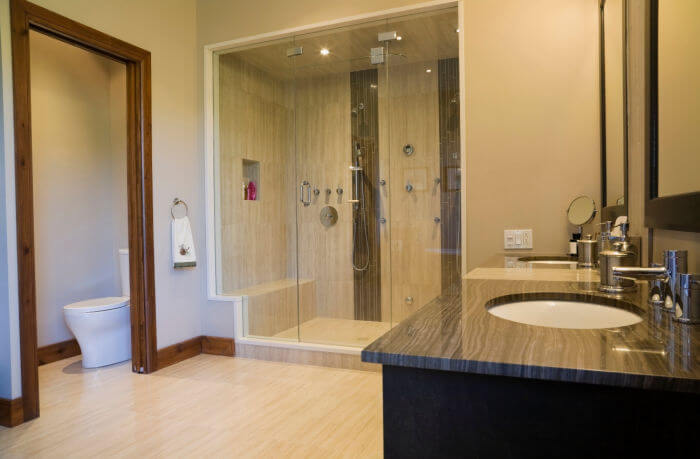
A steam shower can be either a stand-alone steam stall or can be added to your existing shower.
Pros and Cons
Pros
Cons
What Else to Know
You can add a steam element to an existing shower enclosure or install a custom steam shower. Learn all you need know by reading our guide to steam showers, and explore our list of the best steam shower brands of 2026.
Which Type of Shower is Best for My Bathroom?
The right choice for your own bathroom will depend on your bathroom’s size and who will primarily be using and maintaining the shower.
For instance, a small bathroom for guests may be well-suited to a simple, framed shower. A medium-sized bathroom may work better with a shower-tub combo, which are popular in kid-friendly neighborhoods for their resale value and versatility.
Here are a few questions to help you decide.
What Shower is Easiest to Clean?
Two different components can impact how easy it is to clean your shower: the type of frame and the type of material.
For frames, walk-in and frameless showers are easiest to clean. Because there are no nooks and crannies where mildew and soap scum can accumulate between the glass and frame, these shower enclosures only need a glass cleaner to keep them like new.
For materials, there is a fairly simple rule of thumb: the less grout, the easier to clean. That makes acrylic and fiberglass shower floors and shower surrounds easier to maintain than tile showers.
Which Shower Type is Cheapest?
A corner shower with acrylic shower pan and shower surround will be the cheapest. Generally speaking, the smaller the shower, the cheaper it will be. In addition, the more pre-made parts your shower uses, the less labor will be required to install it, which will also bring your price down. A frameless shower with tile will be most expensive.
Which Type of Shower is Best for Resale Value?
This answer will depend on your neighborhood.
For neighborhoods where there are many families with young kids, ensure your home has at least one bathtub or bathtub/shower combo to improve resale value.
For neighborhoods in more expensive areas where luxury touches are expected, frameless showers or walk-in showers should be considered, especially in the primary bathroom or in ensuite bathrooms.
In up-and-coming neighborhoods, a framed or semi-framed shower may be the best choice to ensure your ROI stays high.
Which Type of Shower is Best for the Elderly?
The biggest concern for the elderly is the height of the step-threshold. That should rule out framed showers. A frameless or walk-in shower that has no step threshold would be ideal for elderly family members.
You can also consider a walk-in tub/shower combination, along with grab bars and other safety features to keep your elderly family member safe.
The Bottom Line on Shower Types
The right shower for you will ultimately depend on your bathroom’s size, your local real estate market (if you plan to sell in the next few years), and who will be using the shower most often. If you don’t yet know how to proceed, check out our full shower remodeling guide to learn more about this project.
Of course, once you choose a type of shower, the customization options are nearly endless. From door styles (like frosted or unfrosted glass and designs) to built-in benches to matching hardware and varieties of stone and tile work to consider, the cosmetic element alone is enough to completely overhaul a bathroom’s look and feel. But your choice in type of shower will dictate the bathroom’s overall functionality.
Modernize can match you with trusted bathroom remodelers in your area so you can easily get quotes for a new shower.
Compare top-rated bathroom remodel pros in your area.
Read real homeowner reviews, explore qualifications, and view promotions. Modernize makes it easy to browse professionals and find one that will be perfect for your project.





